初中英语(冀教版)九年级上册(九上)-《Lesson 8 A Universe of Thought》word教案 (4).doc
Lesson8AUniverseofThought教案2023-2024学年冀教版英语九年级全册
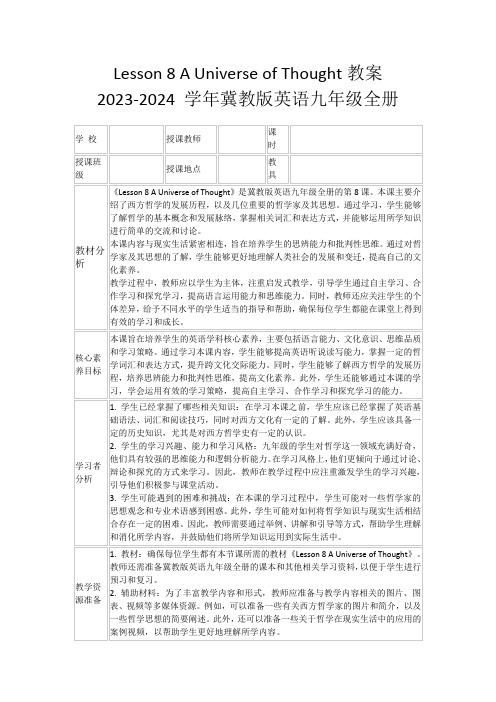
知识点梳理
《Lesson 8 A Universe of Thought》主要介绍了西方哲学的发展历程,以及几位重要的哲学家及其思想。通过学习本课,学生能够了解哲学的基本概念和发展脉络,掌握相关词汇和表达方式,并能够运用所学知识进行简单的交流和讨论。
1.哲学的基本概念:
在互动探究环节,我设计了一些小组讨论环节,让学生围绕问题展开讨论。学生们在讨论中表现出了很高的积极性和合作精神。但我也发现,有些学生在讨论中过于活跃,而另一些学生则显得相对沉默。为了确保每个学生都能参与到讨论中,下次我可以提前分配好任务,让每个学生都有机会发表自己的观点。
在巩固练习环节,我布置了一些随堂练习题,检查学生对知识的掌握情况。大部分学生都能顺利完成练习题,但也有一部分学生在某些问题上遇到了困难。针对这个问题,我可以在课后个别辅导这些学生,帮助他们解决学习上的困难。
-启蒙时期哲学:启蒙时期哲学强调理性、自由和平等,代表人物有笛卡尔、洛克和卢梭等。
-德国古典哲学:德国古典哲学是18世纪末至19世纪初的哲学流派,代表人物有康德、黑格尔和费尔巴哈等。
-现代西方哲学:现代西方哲学包括存在主义、现象学、结构主义、后结构主义等流派,代表人物有海德格尔、萨特、福柯等。
3.重要哲学家及其思想:
3.学生可能遇到的困难和挑战:在本课的学习过程中,学生可能对一些哲学家的思想观念和专业术语感到困惑。此外,学生可能对如何将哲学知识与现实生活相结合存在一定的困难。因此,教师需要通过举例、讲解和引导等方式,帮助学生理解和消化所学内容,并鼓励他们将所学知识运用到实际生活中。
教学资源准备
1.教材:确保每位学生都有本节课所需的教材《Lesson 8 A Universe of Thought》。教师还需准备冀教版英语九年级全册的课本和其他相关学习资料,以便于学生进行预习和复习。
冀教版英语九年级全册_lesson 8 a universe of thought 教案
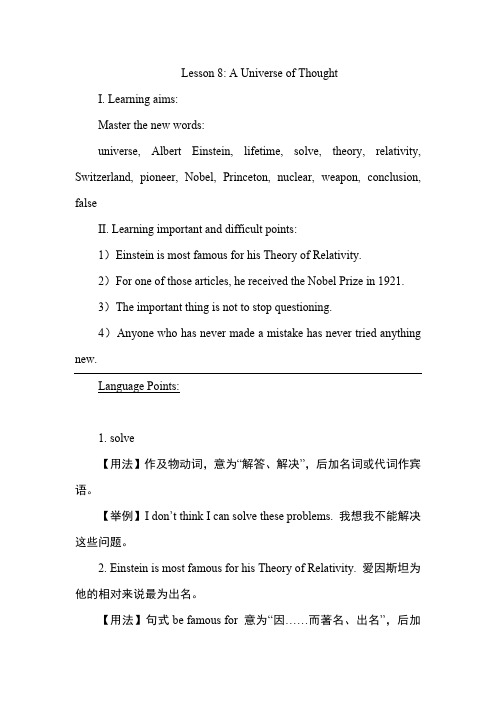
Lesson 8: A Universe of ThoughtI. Learning aims:Master the new words:universe, Albert Einstein, lifetime, solve, theory, relativity, Switzerland, pioneer, Nobel, Princeton, nuclear, weapon, conclusion, falseII. Learning important and difficult points:1)Einstein is most famous for his Theory of Relativity.2)For one of those articles, he received the Nobel Prize in 1921.3)The important thing is not to stop questioning.4)Anyone who has never made a mistake has never tried anything new.Language Points:1. solve【用法】作及物动词,意为“解答、解决”,后加名词或代词作宾语。
【举例】I don’t think I can solve these problems. 我想我不能解决这些问题。
2. Einstein is most famous for his Theory of Relativity. 爱因斯坦为他的相对来说最为出名。
【用法】句式be famous for 意为“因……而著名、出名”,后加表示物的名词、代词作介词for的宾语。
【举例】Hangzhou is famous for tea and silk. 杭州因茶和丝绸而出名。
【拓展】句式be famous as意为“作为……而著名、出名”;后加表示人的名词、代词作介词as的宾语。
冀教版九年级英语上册 Lesson 8【精品课件】
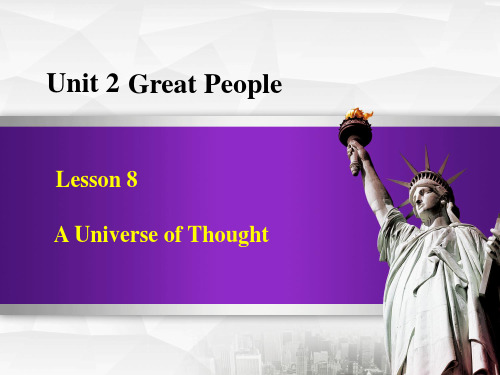
Einstein's sayings “The important thing is not to stop questioning❼.” “Anyone who has never made a mistake has never
tried anything new.” “I think and think for months and years. Ninetynine
知识点 1 learn from 向……学习
eg:His suggestion is that we should learn from Lucy. 他的建议是我们应该向露西学习。
learn from sth. 从某事中吸取教训 eg:What do you learn from the accident?
【点拨】 dead“死亡的”,be found dead“被发现死了”。
知识点 6 pass away
考向一 (时间等)过去,相当于go by。 eg:We had so much fun that the weekend passed away before we realized it. 我们玩得很高兴,不知不觉周末就过 去了。
B.go on doing
C.went on to do D.went on doing
【点拨】本题可用前后照应法,由前面的maths和后面的 physics可知前后做的不是同一件事情,故B、D排除;再 由前面的had finished可知此处应用一般过去时。
知识点 4 receive/rɪ'siːv/ v.接到;收到 eg:I received his letter last week. 我上周收到了他的来信。
Einstein died❺ in 1955. He signed his last letter before he passed away❻. The letter asked people to give up nuclear weapons.
冀教版英语九年级上册9A_Lesson 8导学案(含答案)

Lesson 8: A Universe of Thought【学习目标】知识目标:词汇:universe, Albert Einstein, lifetime, solve, theory, relativity, Switzerland, pioneer,Nobel, Princeton, nuclear, weapon, conclusion, false短语和句型:1.give up doing sth. 放弃做某事2.be famous for 因…而著名be famous as 作为…而著名;3.stop doing sth 停下来正在做的事stop to do sth 停下来去做另一件事;4. mind doing sth 介意做某事能力目标:能够运用before,after 引导的复合句。
能够用英语介绍爱因斯坦的情况。
情感目标:向伟人学习,激发学习兴趣。
【重点及难点】To use the new words and phrases to talk about Einstein and his life.【导学过程】一、自主预习【预习指导】1. 自学教材第8 课单词与词组,你可以听录音跟读,根据音标读,或者请教别人读。
做到发音标准,弄清词性和汉语意思。
2. 自学教材第20 页内容,仔细读课文至少三遍,弄清课文大意。
用红色横线划出文中的重要句子。
【自主学习】(一) 汉译英。
1. 向···学习__________________2. 以···而著名__________________3. 继续做某事__________________4. 停止做某事__________________5. 在···领域__________________6. 诺贝尔奖__________________7. 核武器__________________ 8.去世__________________9. 犯错误__________________ 10.长年累月__________________(二) 在自学过程中,你还有哪些疑惑用红色波浪线在文中画出来,并把它写下来,和你的同伴交流。
冀教版九年级英语全册同步练习 Lesson 8 A Universe of Thought(含答案)

冀教九年级上册Lesson 8练习Ⅰ. 根据句意,从下面方框中选择适当的单词,并用其正确形式填空。
1. After he graduated from college, he a teacher in our school.2. The doctor many of my problems in the morning.3. Li Dazhao was a of the Chinese revolution (革命).4. When you try a new thing, you may make some , but don’t give up.5. Joe three letters this morning.Ⅱ. 选用适当的介词填空,每项限用一次。
maths this term?— Much better.7. Grandpa Li has been in two wars his lifetime.8. I hurt my leg, and have to stay in bed two weeks.9. Rose wants to teach a university in the future.10. Are you thinking the party? I can help.Ⅲ. 根据汉语意思翻译句子,每空一词。
11. 这个小镇以美食闻名。
The small town its delicious food.12. 毕业后我将继续去美国学习英语。
I will English in America after I finish school.13. 很遗憾地告诉你她昨天在家去世了。
I’m sorry tell you that she at home yesterday.14. 我的脚受伤了,所以我必须放弃比赛。
I hurt my foot, so I have to the match.15. 保罗·乔布斯在动画电影领域是一位很重要的人物。
冀教初中英语九上《Lesson 8 A Universe of Thought》(共15张PPT).

…
1879
be born
1905 began to write articles and became…
1921 received the Nobel Prize
1933 left Germany and went to teach at…
1955
died
Homework
Write a short passage about your favorite Nobel Prize winner.
• 4.Einstein became a teacher of Princeton University from 1933.( T )
• 5..In his last letter, Einstein hoped that people could stop nuclear weapons.( T)
Group Work
Group work
在某人的一生中 during one’s lifetime
以/作为…而闻名 be famous for/as
Байду номын сангаас
在…领域
in the field of
继续(做…) go on (to do)
成年累月
for months and years
去世
pass away
name: Albert Einstein birth: 1879 birthplace: Germany
What do you know about him ?
冀教版九年级英语上册Lesson 8 A Universe of Thought课件

2. What is Einstein most famous for? He is most famous for his Theory of Relativity.
3. In what countries did Einstein teach? He taught in Switzerland, Germany and the United States. 4. What did he ask people to do in his last letter?
After he finished school, he went on to study _p_h__y_si_c_s_ in Switzerland. In 1921, he received the _N_o_b_e_l_P_r_i_z_e. In 1933, he left Germany and went to teach at Princeton University in the _U_n_i_te_d__S_t_a_te_s_. Before he passed away, he signed a letter to ask people to g_i_v_e_u__p nuclear weapons. His sayings are “The important thing is not to __s_to_p__ _q_u_e_s_ti_o_n_i_n_g_. Anyone who has never __m_a_d__e_a_m__i_st_a_k_e__ has never tried_a_n_y_t_h_i_n_g_n__ew__.
1. Einstein’s hobbies 2. Einstein’s sayings 3. Einstein’s early years 4. Einstein’s family 5. Einstein, the teacher
冀教初中英语九上《Lesson 8 A Universe of Thought》word教案 (2)

2.Show the culture tip about the Nobel Prize.
Learn new words and phrases in the lesson.
Fill in the blanks with the correct forms of the words in the box.
The Ss try to fill in the blanks with the words and phrases in the lesson.
To check if they grasp the
Discuss it in groups and choose some of them to talk in class.
To give Ss time to prac-
tice their speaking abilities.
Step6: Writing
Ask the Ss to write a short passage about theirfavourite Nobel Prize winner.
To use the new words and phrases to talk about great people and their lives
Teaching tools
PPT, radio
Teacher’s activities
Students ’activities
Aims
Step1: Warm up
main words and phrases in the lesson.
冀教版九年级英语 Lesson 8 A Universe of Thought说课稿
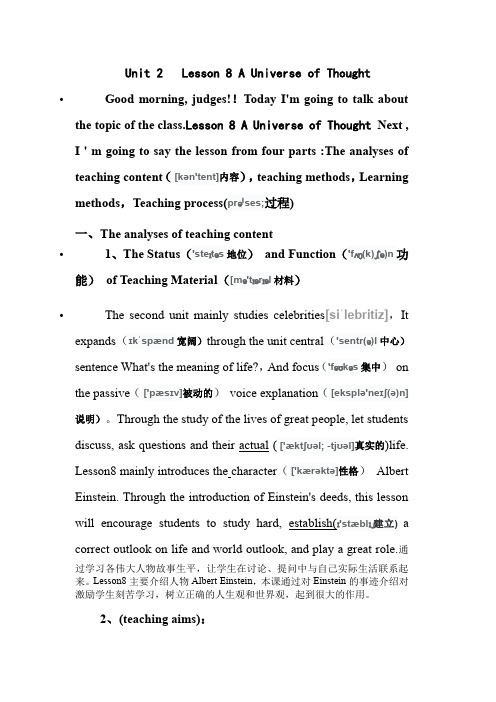
Unit 2 Lesson 8 A Universe of Thought∙Good morning, judges!!Today I'm going to talk about the topic of the class.Lesson 8 A Universe of Thought Next ,I ' m going to say the lesson from four parts :The analyses ofteaching content( [kən'tent]内容),teaching methods,Learning methods,Teaching process(prəˈses;过程)一、The analyses of teaching content∙1、The Status('steɪtəs地位)and Function('fʌŋ(k)ʃ(ə)n功能)of Teaching Material([mə'tɪərɪəl材料)∙The second unit mainly studies celebrities[siˈlebritiz],It expands(ɪkˈspænd宽阔)through the unit central('sentr(ə)l中心)sentence What's the meaning of life?,And focus('fəʊkəs集中)on the passive( ['pæsɪv]被动的)voice explanation([eksplə'neɪʃ(ə)n]说明)。
Through the study of the lives of great people, let students discuss, ask questions and their actual ( ['æktʃʊəl; -tjʊəl]真实的)life.Lesson8 mainly introduces the character(['kærəktə]性格)Albert Einstein. Through the introduction of Einstein's deeds, this lessonwill encourage students to study hard, a correct outlook on life and world outlook, and play a great role.通过学习各伟大人物故事生平,让学生在讨论、提问中与自己实际生活联系起来。
冀教版初中英语九年级上册Lesson 8 A Universe of Thoughtword教案 (4)

1.Show a picture aboutthe excellent Chinese scientistswho have got the Nobel Prize.
2.Talk about your favourite Nobel Prize winner.
Discuss it in groups and choose some of them to talk in class.
Fill in the blanks with the correct forms of the words in the box.
The Ss try to fill in the blankswith thewords and phrases in the lesson.
To check if they grasp the main words and phrases in the lesson.
3. Show the questions about the lesson and then check the answers with the Ss.
1)What problems did Einstein solve during his lifetime?
2)What is Einstein most famous for?
Listen and read after the tape.
The Ss complete the exercise independentlyand then discuss the answers in groups.
Read the lesson again and answer the questions.
新冀教版上册九年级英语(lesson8)

Albert Einstein (1879--1955)
He received the Nobel Prize in 1921.
Albert Einstein (1879--1955)
Culture Tip The Nobel Prize is widely regarded as the most important award in the fields of literature, medicine, physics, chemistry and peace. It was established by the will of the Swedish inventor Alfred Nobel in 1895. A sixth prize, for economics, was created in 1968. The 2012 Nobel Prize in Literature was awarded to Mo Yan, a famous Chinese writer.
5.Has anyone tried anything new if he has never made a mistake? 一个从不犯错的人是永远 No, he hasn’t. 不会尝试新事物的。 Einstein’s sayings “The important thing is not to stop questioning.” “Anyone who has never made a mistake has never tried anything new.” “I think and think for months and years. Ninety-nine times, the conclusion(结论) is false ( 错误的 ) . The hundredth time I am right.”
2019年冀教版初中英语九年级上册Lesson 8 A Universe of Thought优质课教案(4)

Teaching tools
PPT, radio
Teacher’s activities
Students ’activities
Aims
Step1: Warm up
3) In what countries did Einstein teach?
4) What did he ask people to do in his last letter?
5) Has anyone tried anything new if he has never made a mistake?
To give Ss time to practice their speaking abilities.
Step6: Writing
Ask the Ss to write a short passage about theirfavourite Nobel Prize winner.
.
Write a short passage about their survey.
Ability
To be able to talk about great people and their lives
Emotion
To be proቤተ መጻሕፍቲ ባይዱd of the excellent Chinese scientists and learn from them.
Teaching difficult points and important points
Fill in the blanks with the correct forms of the words in the box.
最新冀教版初中英语九年级上册《Lesson 8 A Universe of Thought》精品PPT课件 (1)

Look and say
solve
v. 解决;解答 to find an answer to a problem
Just calm down - shouting won't solve anything! 冷静下来——大叫大嚷并不能解决任何问题! This strategy could cause more problems than it solves. 这一策略引发的最问新初题中可英语能精品会课件比设计解决的还多。
We have celebrated the festival since the first pioneers from England arrived in America.
自17世纪首批英格兰的拓荒者抵达美洲大陆 后,我们就一直最新庆初中祝英这语精个品课节件设日计 。
Free talk
1. What do you know about Einstein?
3. In what countries did Einstein teach?
3. He taught in Switzerland, Germany and the United.
4. What did he ask people to do in his last letter?
4. He asked people to give up nuclear.
2
1. In what field did Einstein solve many problems during his lifetime?
1. He solved many problems in physics.
2. What is Einstein most famous for?
冀教版九年级英语上册第二单元Lesson 8 A Universe of Thought 教学设计

Title
Lesson 8: A Universe of Thought
Teaching aims
Knowledge
By the end of the lesson, the students will be able to read, understand and use the new words and phrases e.g. solve, pioneer, go on to…, in the field of…, pass away.
Ability
To be able to talk about great people and their lives
Emotion
To be proud of the excellent Chinese scientists and learn from them.
Teaching difficult points and important points
To guide the student to get the main details of the text and lead inthe new concept.
Step3: New Concept
1. Play the audiotape for the lesson.
2.Read the lesson and fill in the blanks.
To use the new words and phrases to talk about great people and their lives
Teaching tools
PPT, radio
【最新名师设计】冀教初中英语九上《Lesson 8 A Universe of Thought》word教案 (1).doc
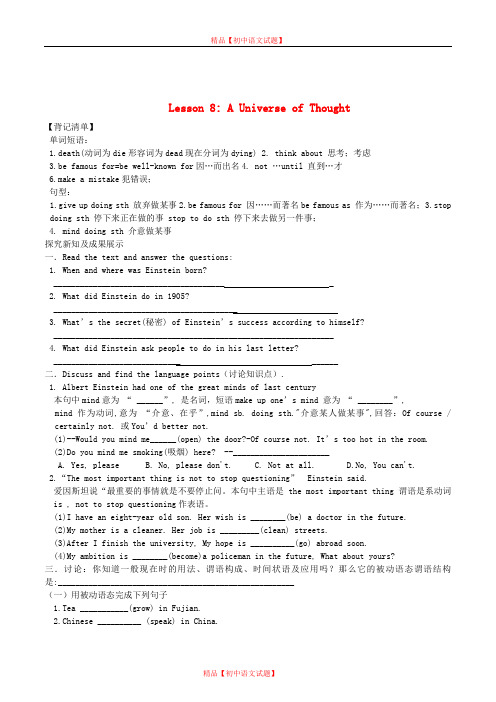
Lesson 8: A Universe of Thought【背记清单】单词短语:1.death(动词为die形容词为dead现在分词为dying)2. think about 思考;考虑3.be famous for=be well-known for因…而出名4. not …until 直到…才6.make a mistake犯错误;句型:1.give up doing sth 放弃做某事2.be famous for 因……而著名be famous as 作为……而著名;3.stop doing sth 停下来正在做的事 stop to do sth 停下来去做另一件事;4. mind doing sth 介意做某事探究新知及成果展示一.Read the text and answer the questions:1. When and where was Einstein born?_______________________________________ _ 2. What did Einstein do in 1905?__________________________________________3. What’s the secret(秘密) of Einstein’s success according to himself?________________________________________________________________4. What did Einstein ask people to do in his last letter?_____________________________ ______二.Discuss and find the language points(讨论知识点).1. Albert Einstein had one of the great minds of last century本句中mind意为“ ______”, 是名词,短语make up one’s mind 意为“ ________”,mind作为动词,意为“介意、在乎”,mind sb. doing sth."介意某人做某事",回答:Of course / certainly not. 或You’d better not.(1)--Would you mind me______(open) the door?-Of course not. It’s too hot in the room.(2)Do you mind me smoking(吸烟) here? --______________________A. Yes, pleaseB. No, please don't.C. Not at all.D.No, You can't.2.“The most important thing is not to stop questioning” Einstein said.爱因斯坦说“最重要的事情就是不要停止问。
2024年冀教版九年级英语上册 Lesson 8 A Universe of Thought

Lesson8A Universe of Thought教学目标通过本课的学习,学生能够:1.获取和梳理爱因斯坦的生平,形成信息结构图。
(学习理解)2.基于信息结构图的内容,结合自己对爱因斯坦的了解,转述爱因斯坦的生平。
(应用实践)3.运用本课所学词汇和句型,结合自己的认知,谈论一位自己喜欢的人物。
(迁移创新)语篇研读What:本课语篇是一篇记叙文,主要介绍了科学家爱因斯坦的早年生活和学习经历,介绍了他在物理学界的伟大成就以及对后人的激励。
Why:通过介绍爱因斯坦的生平,帮助学生更好地认识伟人,激励学生刻苦学习,树立正确的人生观和世界观。
How:语篇先简单介绍了爱因斯坦的成就,然后以时间为线索,介绍了爱因斯坦的主要经历,最后介绍了爱因斯坦的名言。
教学过程设计理念:以《义务教育英语课程标准(2022年版)》核心素养为导向,以单元主题为引领,基于语篇的育人理念,体现《义务教育英语课程标准(2022年版)》“学思用创”的英语学习活动观和“教—学—评”一体化设计理念。
教学目标学习活动效果评价Lead-in通过图片导入本课主题Show a picture of Albert Einstein andhis theory:E=mc2.Ask:Who is he?What does“E=mc2”mean?观察学生表现,根据学生的表现预判学生对爱因斯坦的了解情况设计意图通过图片导入本课主题,激发学生兴趣Activity1: Presentation 学习本课新词Learn new words in the lesson bywatching pictures.Try to grasp inclass.(见PPT)观察学生能否认读本课新词,对拼写暂不做要求设计意图通过图片和设置的情景能更好地帮助学生理解、掌握本课单词【学习理解】Activity2:Listening听前预测,听中获取有用信息Listen and choose.(见PPT)观察学生能否准确获取有用信息,并给出指导设计意图通过听力提取有关爱因斯坦的细节信息,并使用听中抓取关键词、速记等策略完成听力任务【学习理解】Activity3:Fast reading速读,获取文章信息Read and answer the questions.(见PPT)观察学生的答题情况,了解学生对文章的初步理解程度设计意图快速阅读课文,初步了解课文内容,让学生对文章有一个整体的认知【学习理解】Activity4: Careful reading细节阅读,让学生对文本内容进行深度解析Read and fill in the blanks.(见PPT)观察学生是否能准确获取并理解文章的细节,能否完成相关任务设计意图细读,让学生进一步理解并梳理课文内容,并在实践中运用所学词汇【学习理解】Activity5:Retell 复述课文Finish the mind map.Then retell thetext.(见PPT)观察学生能否完整、顺利地进行语言输出,给予学生适当的点拨设计意图复述文本内容,让学生学会运用本课词汇和句型,并加深对文章的理解,完成知识的系统化巩固【应用实践】Activity6:Language points and summary 通过知识点的学习,帮助学生解决后续学习中的问题1.mind的短语2.be famous for、be famous as与befamous to的区别3.go on的用法4.pass的短语观察学生是否能够理解、掌握重要知识点,并能够区分易混词设计意图对本课重要知识点进行分析讲解,让学生掌握其相关用法,积累一定的词汇【学习理解】Activity7: Work in groups 小组合作Who do you admire?What is his/hermain achievement?Talk about him/herwith your group members.观察学生小组讨论和完成任务的情况,倾听Task tips:·When and where was he/she born?·What did he/she do?·What was he/she most famous for?学生的展示并根据实际情况给出必要的指导和反馈设计意图小组合作,让学生能够谈论自己敬佩的人,并使学生能够整体使用语言素材。
冀教版九年级英语全册Lesson8AUniverseofThought学案
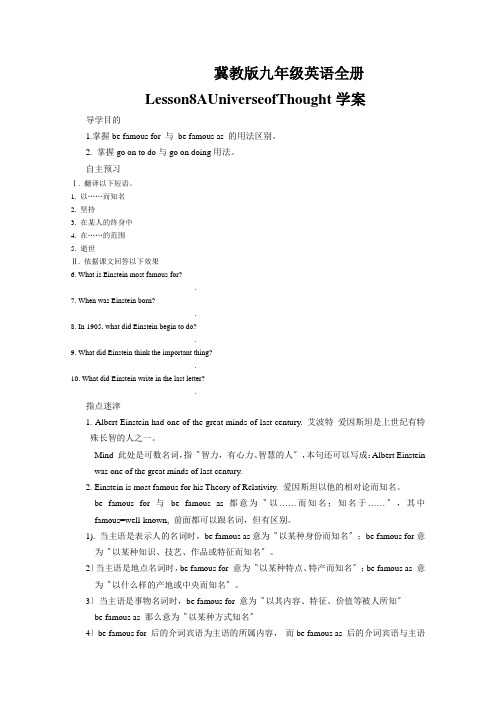
冀教版九年级英语全册Lesson8AUniverseofThought学案导学目的1.掌握be famous for 与be famous as 的用法区别。
2. 掌握go on to do与go on doing用法。
自主预习Ⅰ. 翻译以下短语。
1. 以……而知名_____________2. 坚持_____________________3. 在某人的终身中___________4. 在……的范围___________________5. 逝世___________________Ⅱ. 依据课文回答以下效果6. What is Einstein most famous for?_______________________________.7. When was Einstein born?_______________________________.8. In 1905, what did Einstein begin to do?_______________________________.9. What did Einstein think the important thing?_______________________________.10. What did Einstein write in the last letter?_______________________________.指点迷津1. Albert Einstein had one of the great minds of last century. 艾波特爱因斯坦是上世纪有特殊长智的人之一。
Mind 此处是可数名词,指〝智力,有心力、智慧的人〞,本句还可以写成:Albert Einstein was one of the great minds of last century.2. Einstein is most famous for his Theory of Relativity. 爱因斯坦以他的相对论而知名。
- 1、下载文档前请自行甄别文档内容的完整性,平台不提供额外的编辑、内容补充、找答案等附加服务。
- 2、"仅部分预览"的文档,不可在线预览部分如存在完整性等问题,可反馈申请退款(可完整预览的文档不适用该条件!)。
- 3、如文档侵犯您的权益,请联系客服反馈,我们会尽快为您处理(人工客服工作时间:9:00-18:30)。
1.Show a picture aboutthe excellent Chinese scientists who have got the Nobel Prize.
2.Talk about your favourite Nobel Prize winner.
Discuss it in groups and choose some of them to talk in class.
To give Ss time to practice their writing abilities.
Home-work
1.Finish off the exercises in the lesson.
Read and learn something aboutthe Nobel Prize.
To motivate the Ss and prepare for the new lesson.
Step2:Lead-in
Play the audiotape for Lesson 8.
The Ss Listen and circle the thing about Einstein that is NOT mentioned in the lesson.
To guide the student to get the main details of the text and lead in the new concept.
Step3: New Concept
1. Play the audiotape for the lesson.
2. Read the lesson and fill in the blanks.
Fill in the blanks with the correct forms of the words in the box.
The Ss try to fill in the blanks with the words and phrases in the lesson.
To check if they grasp the main words and phrases in the lesson.
Lesson 8: A Universe of Thought
Title
Lesson 8: A Universe of Thought
Teaching aims
Knowledge
By the end of the lesson, the students will be able to read, understand and use the new words and phrases e.g. solve, pioneer, go on to…, in the field of…, pass away.
Listen and read after the tape.
The Ss complete the exercise independently and then discuss the answers in groups.
Read the lesson again and answer the questions.
In order to correct the students' pronunciation
To get to know the key information about the lesson.
To get to know the details about the lesson.
Step 4: Exercise
Ability
To be able to talk about great people and their lives
Emotion
To be proud of the excellent Chinese scientists and learn from them.
Teaching difficult points and important points
1.Show some pictures and teach new words and phrases in the lesson.
2.Show the culture tip about the Nobel Prize.
Learn new words and phrases in the lesson.
3. Show the questions about the lesson and then check the answers with the Ss.
1)What problems did Einstein solve during his lifetime?
2) What is Einstein most famous for?
To use the new words and phrases to talk about great people and their lives
Teaching tools
PPT, radio
Teacher’s activities
Students ’activities
Aims
Step1: Warm up
To give Ss time to practice their speaking abilities.
Step6: Writing
Ask the Ss to write a short passage about theirfavourite Nobel Prize winner.
.
Write a short passage about their survey.
3) In what countries did Einstein teach?
4) What did he ask people to do in his last letter?
5) Has anyone tried anything new if he has never made a mistake?
